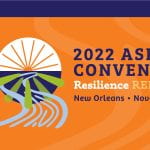
Mandak, K., Light, J., & McNaughton, D. (2020). The effects of an online training on preservice speech-language pathologists’ use of family-centered skills. American Journal of Speech-Language Pathology. Advanced Online Publication. https://doi.org/10.1044/2020_AJSLP-19-00057
Purpose: Despite the recognition that family-centered services are best practice in augmentative and alternative communication services, many speech-language pathologists (SLPs) are lacking in their acquisition and implementation of family-centered skills. The purpose of this study was to evaluate the effects of online instruction in a family-centered, relational skills strategy on preservice SLPs use of family-centered skills.
Method: A switching replications design was used to evaluate the effects of an online training on the use of family-centered behaviors by 15 preservice SLPs who were randomly assigned to two groups. The online training taught the students a four-step relational skills strategy (summarized by the acronym LAFF): (a) Listen, empathize, and communicate respect; (b) Ask questions; (c) Focus on the issues; and (d) Find a first step. Participants were videotaped during interactions with simulated parents before and after the training.
Results: After an average of 61 min of instruction via the online module, all of the preservice SLPs significantly improved their demonstration of relational skills. Additionally, one parent of a child who used augmentative and alternative communication viewed the video recordings and chose 14 of the 15 postinstruction role plays as more family-centered.
Conclusion: The findings from this study provide support for the use of an online environment to teach preservice SLPs family-centered relational skills. In order to prepare future SLPs and ensure the delivery of family-centered services, future research is necessary, including investigations to determine whether other family-centered skills can be effectively taught through an online environment.
Interested in learning more? You can access the full paper below.
Mandak, Light, & McNaughton (2020) Accepted Manuscript Version

